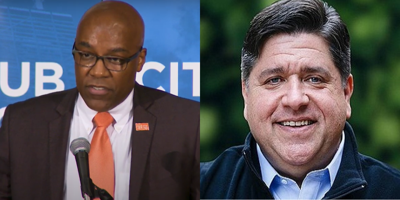
Illinois Attorney General Kwame Raoul and Gov. JB Pritzker
CHICAGO - An Illinois workplace privacy law that slaps stringent new rules on employers who use E-Verify to check if their workers are legal and threatens them with fines and lawsuits if they break those rules doesn't intrude on the federal government’s authority to regulate immigration, a federal judge has ruled.
On Aug. 19, U.S. District Judge Sharon Johnson Coleman tossed a lawsuit brought by the Trump administration seeking to block the state of Illinois from enforcing the new law.
In the ruling, Coleman said she believed allowing the Trump administration’s lawsuit to continue could allow the federal government to instead violate the ability of states to regulate workplaces and treatment of employees.
“The broad interpretation suggested by the federal government—that any state law that relates to federal employment verification systems is preempted by (federal law)because it touches and concerns workers who may not have authorization—would sweep in all manner of employee-protection laws, not to mention any state law that mandated the use of E-Verify,” Coleman wrote.
She further specifically noted that she believed that the federal government’s assertion that the state of Illinois is using the new law to discourage employers from using E-Verify is based on “nothing but speculation.”
Coleman was appointed to the federal bench by former President Barack Obama.
The new state law, known as SB0508, was enacted nearly a year ago by the state's Democratic governing supermajority and signed into law by Gov. JB Pritzker, also a Democrat. The law took effect in January 2025.
Nominally, SB0508 authorized revisions to Illinois' so-called "Right to Privacy in the Workplace Act."
Functionally, however, SB0508 created new regulations governing how employers can treat suspected illegal immigrants who apply for jobs or who may already be on their workforces.
Under the language added to the Illinois workplace privacy law by SB0508, for instance, employers in Illinois would be forbidden from imposing "work authorization verification ... requirements greater than those required by federal law."
The state law requires employers to provide at least seven days notice to workers before immigration or labor officials inspect the federal I-9 work authorization forms the company is required to keep on file for its workers.
And the law forbids employers from taking any "adverse employment action" against a worker, even after learning of a potential violation, until the Social Security Administration or the Department of Homeland Security provides the employer with a "final notice" that they cannot confirm the worker is eligible to work legally in the country.
Employers who are accused of violating the law could face lawsuits from workers and enforcement actions from the Illinois Department of Labor. Penalties could run up to $5,000 for a first violation and up to $10,000 for later violations.
The wording of the law and its likely effects have led critics of the legislation, including the Justice Department under President Donald Trump, to blast the law as a clever attempt to continue shielding illegal immigrant workers and complicating federal immigration enforcement in Illinois.
Should employers choose to follow federal law, the state could penalize them. But if they opt to abide by state law, they face the risk of penalties from the federal government.
Under federal law, every employer in the U.S. is allowed to use the E-Verify system, operated by the U.S. Citizenship and Immigration Services, to screen job applicants and workers to determine their eligibility to work.
Federal law requires employers to verify their workers are legally authorized to work. Employers who knowingly hire illegal immigrants or others without proper documents or work authorization could face massive and potentially business-threatening penalties.
These can include fines of $3,000 per worker if federal immigration and labor officials establish employers failed to verify I-9s, and penalties of $16,000 per worker if it is determined they knowingly hired those ineligible to work in the U.S.
Employers can also face jail time.
The Justice Department filed suit in May in Chicago federal court, asking the court to block the state of Illinois from enforcing the changes to state law spelled out in SB0508.
The action marked the second time in a little over 15 years that the federal government and Illinois have clashed in court over attempts by Illinois Democrats to regulate the use of E-Verify.
In 2009, a federal judge blocked an Illinois state law which had outright prohibited Illinois employers from using E-Verify, as state officials claimed the system was too inaccurate. A federal judge agreed the state had trespassed on the federal government's legal turf and unconstitutionally attempted to interfere with immigration enforcement.
In the new action, the Justice Department asserted SB0508 represents a more sly attempt to accomplish much the same goal, in a bid by Illinois Democrats to provide sanctuary to illegal immigrants.
Illinois Democrats, including Pritzker and Illinois Attorney General Kwame Raoul, have been among some of the loudest and most persistent critics of efforts by the Trump administration to locate and deport illegal immigrants in the U.S.
In response, Raoul argued SB0508 was not intended to undermine immigration enforcement efforts, but rather to protect American citizens and immigrants legally authorized to work in the U.S. from being falsely identified as illegal immigrants.
The state argued the law fell within the state's constitutional authority to enact labor laws governing the treatment of workers.
The Trump administration called the state's take “absurd.”
The Justice Department said the law was instead a clever attempt by Illinois Democrats opposed to immigration enforcement in general to use state law to accomplish a goal similar to that of the earlier law, by at least reducing the number of employers using E-Verify to screen out illegal immigrants from their workforces.
The Justice Department noted the state law could be interpreted to essentially forbid employers in Illinois from using E-Verify altogether, unless they were federal contractors. Under federal law, the use of E-Verify is voluntary for all employers except federal contractors.
Judge Coleman, however, adopted Raoul’s take on the interplay between the state and federal laws, and adopted in whole the state's assertions concerning the purpose of the law: to “protect workers,” rather than frustrate federal workplace immigration enforcement.
In her ruling, Coleman said she agreed that Congress has not expressly forbid states from enacting workplace privacy rules regulating how employers can use the E-Verify system. Neither, she said, does a federal policy encouraging employers to use E-Verify preempt the state law in practice.
“It does not follow that requiring employers to protect the rights of employees—Americans and those who are authorized to work in this country—does such major damage as to create an obstacle to Congress’s goal…,” Coleman wrote.
The judge further adopted the state's legal position expressed in its motion to dismiss, as the judge challenged the federal government to show the new state “privacy protections” have somehow measurably reduced E-Verify participation among Illinois employers in the first eight months the law has been in place and before any enforcement actions have been publicly launched by the Illinois Labor Department or any private lawsuits filed.
Until then, the potential risks facing employers and conflict with federal immigration law under the new state law are just “speculation,” the judge said.






